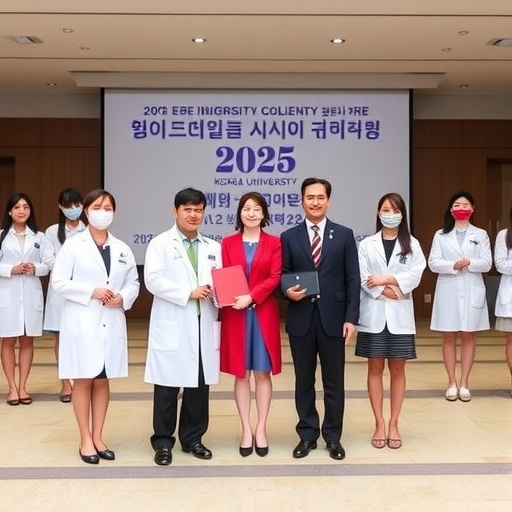Korea University College of Medicine, under the leadership of Dean Pyun Sung-beom, has recently held a significant entrance ceremony marking the commencement of the degree integration course within the esteemed Lee Jong-wook Fellowship Program for the fall semester of the 2025 academic year. This momentous event took place at Choi Jong Hyun Hall, SK Future Hall, on Wednesday, September 10th. The ceremony stands as a testament to Korea University’s ongoing commitment to advancing global healthcare education and nurturing future leaders in medicine and public health.
The Lee Jong-wook Fellowship Program’s degree integration course represents an innovative educational pathway designed to bridge diverse healthcare disciplines by integrating master’s degree curricula in basic medicine, medical education, and nursing. This program specifically targets healthcare professionals from developing and transitional countries, including Laos, Mongolia, Vietnam, Uzbekistan, Uganda, Ethiopia, Tanzania, and Cambodia. Through this initiative, Korea University College of Medicine is addressing critical gaps in advanced medical and healthcare workforce training, thereby contributing to building sustainable healthcare systems in these regions.
The cohort for this academic phase has expanded significantly compared to the first period. Initially, 15 students were enrolled, whereas the current intake adds 12 new professionals, bringing the total number of trainees to 27. These students are carefully selected based on their potential to impact healthcare practices and policies in their home countries. By undergoing an interdisciplinary curriculum that combines theoretical knowledge with practical application, trainees are equipped with the capabilities needed to lead transformative healthcare innovations and improvements.
This degree program not only emphasizes academic excellence but also fosters a robust network of global cooperation. Graduates are envisioned to form a virtuous cycle—where rigorous research complements clinical education and healthcare practice. This holistic approach aims at systemic enhancement of healthcare delivery models upon their return home. The program’s strength lies in its personalized competency training, which is tailored to align with the specific healthcare challenges and developmental goals of each participant’s country.
A paramount aspect of the fellowship is its focus on strengthening governance capacity in healthcare workforce development. Trainees receive comprehensive support in leadership skills and health system management, which are critical for building resilient healthcare infrastructures. This focus on governance equips graduates to influence policy reform, optimize resource allocation, and lead their respective healthcare institutions towards higher efficiency and sustainability.
The words of Niwamanya Keneth, a newly inducted student representative from Uganda, encapsulate the transformative potential of the program. He expressed profound gratitude for the opportunity, highlighting its significance not just for individual advancement but for the broader development of his nation’s healthcare sector. This sentiment resonates with the program’s overarching vision of empowering healthcare professionals to become agents of change in their communities.
Dean Pyun Sung-beom reiterated his unwavering support, urging students to seize this unparalleled chance to gain cutting-edge medical knowledge and skills through Korea University’s premier educational infrastructure. His vision extends beyond academic attainment to the pivotal role these graduates will play in elevating healthcare standards and outcomes in their home countries. The dean’s commitment underscores the institution’s role as a central hub for cultivating global health leaders.
The Lee Jong-wook Fellowship itself is a flagship healthcare official development assistance (ODA) initiative under the Korean Ministry of Health and Welfare. It functions as an invited training program aimed at enhancing the capabilities of healthcare personnel from developing countries. The program’s duration is flexible, ranging from intensive short-term modules of two months to more comprehensive training that can extend up to two years. This adaptability ensures relevance to various professional development needs and country-specific contexts.
Since its inception in 2009, the fellowship program has successfully graduated 1,672 healthcare professionals hailing from over 30 countries. These alumni have gone on to assume crucial roles in their respective health sectors, contributing to improved health outcomes and strengthened healthcare systems worldwide. The integration of a degree pathway within this training paradigm further amplifies its impact by offering formal academic qualifications alongside specialized skill development.
Korea University College of Medicine’s introduction of this degree integration course marks a strategic evolution in international health workforce education. It reflects a shift towards more comprehensive capacity building that encompasses not only clinical expertise but also educational proficiency and systemic leadership. This multidimensional training paradigm is essential for addressing the increasingly complex health challenges faced by developing countries in the 21st century.
Through this program, Korea University College of Medicine is positioning itself as a global nexus for healthcare talent development, fostering cross-cultural academic exchanges and pioneering innovative educational methodologies. The program’s success serves as a model for other institutions seeking to contribute meaningfully to global health equity. As trainees graduate and reintegrate into their home countries, they carry with them not only advanced knowledge but also a global perspective critical for transformative healthcare delivery.
In conclusion, the Lee Jong-wook Fellowship’s degree integration course stands as a groundbreaking initiative that bridges education, research, and practical healthcare service. It cultivates a cadre of healthcare professionals equipped to enhance health governance, implement evidence-based practices, and lead future innovations in global health. The program’s continued expansion and success underscore the essential role of international collaboration in tackling pressing health disparities worldwide.
Subject of Research: Healthcare workforce capacity building, medical education, global health development
Article Title: Korea University Medicine Advances Global Health Workforce with Lee Jong-wook Fellowship Degree Integration Course
News Publication Date: September 10, 2025
Web References: None provided
References: None provided
Image Credits: KU Medicine
Keywords: Science teaching, Public health, Scientific associations
Tags: advanced medical trainingdeveloping countries healthcareGlobal Health Initiativeshealthcare educationHealthcare workforce developmentintegrated degree programinternational student cohortKorea University College of MedicineLee Jong-wook Fellowship Programmedical education innovationpublic health leadershipsustainable healthcare systems





